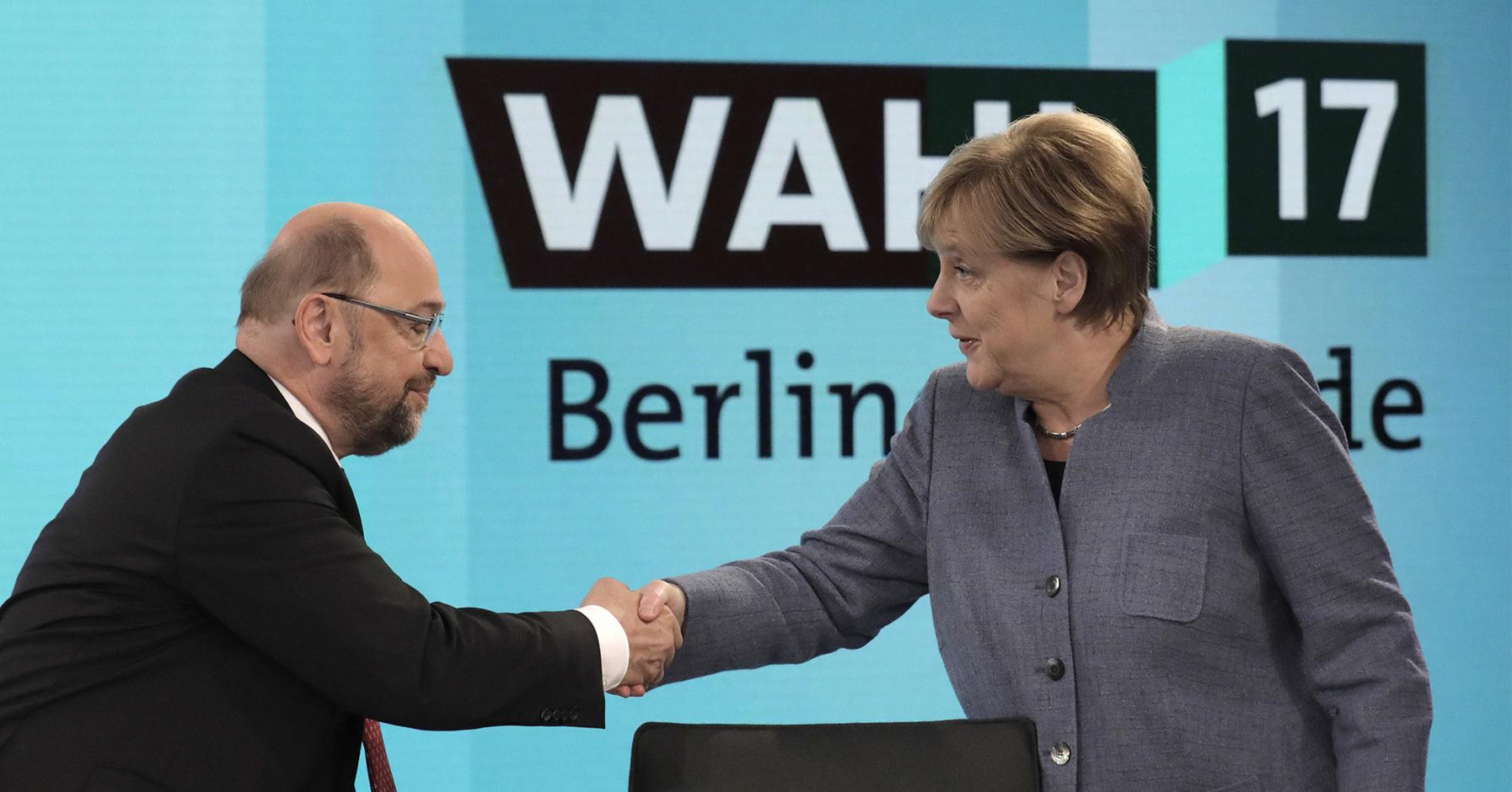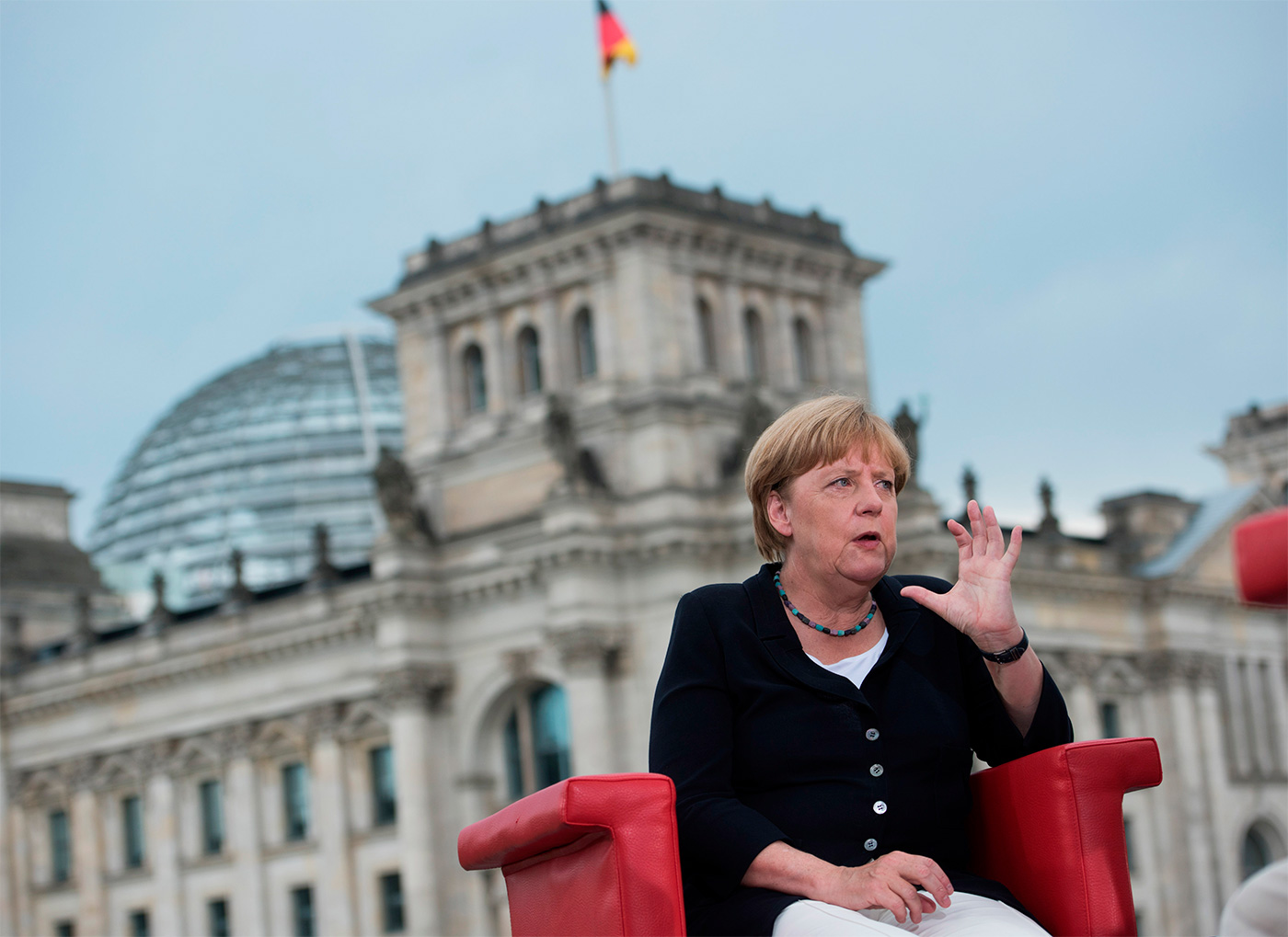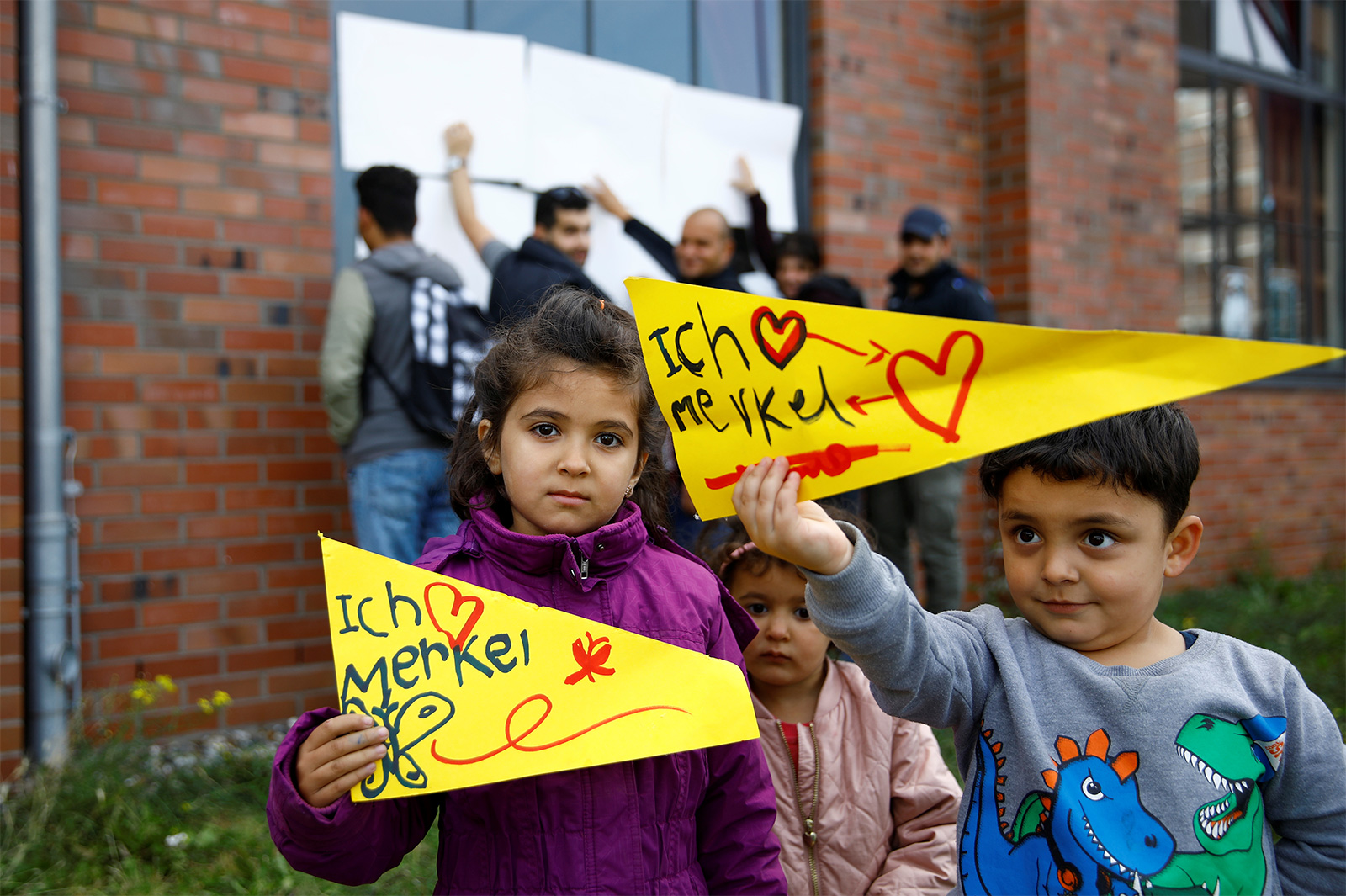Germany today is at a crossroads, divided, uncertain. Christian Lindner, Chairman of the Free Democratic Party, has walked away from coalition negotiations, leaving Merkel in political limbo.
Any coalition with Merkel at its head will be highly unstable. As soon as a situation arises where they could win at the weakened CDU/CSU’s expense, the party’s coalition partners will do their best to collapse the government and to run new elections.
Since the German elections, the Prime Minister has ramped up her attacks on Russia and her promises to protect Europe. At the Lord Mayor’s Banquet this November, she stated that the "UK will remain unconditionally committed to maintaining Europe’s security,” in face of Russia and other states which seek to “undermine” “free societies.”
The British Lion could win back its place from the ailing German Eagle. The chance for Britain is historic. If she is to seize it, Theresa May must act quickly. In the meantime, one thing is clear: Merkel ist kaputt.
Germany today is at a crossroads, divided, uncertain. Christian Lindner, Chairman of the Free Democratic Party, has walked away from coalition negotiations, leaving Merkel in political limbo. Whether the Social Democrats will again agree to a 'Grand Coalition' remains uncertain. The fundamental reason for Merkel's demise stands beyond domestic trouble, and even beyond the murky waters of the EU. She was struck down by the same crisis that brought to power Donald Trump. Germany’s weakness offers a chance for Britain.
If one focuses exclusively on Germany’s domestic situation, the current political crisis may appear somewhat surprising. The German economy is flourishing. Earlier this year, Germany overtook the UK as the fastest growing economy among the G7. The country is recovering after the 2008 crisis. Germans enjoy some of the highest living standards in the EU. Overall, the country is doing very well.
Certainly, Merkel was expected to lose some support due to her open-door refugee policy. After she announced the policy in 2015, some cheered Merkel for stretching Germany’s hand out to those in need, while others warned that an uncontrolled flux of refugees into Germany would pose long-term challenges for social integration. Her most vehement opponents migrated further right, voting for Alternative für Deutschland. As a result, the far-right entered the Bundestag for the first time since World War II. Disagreement on policies concerning the reunification of refugee families was one of the reasons why the Jamaica coalition failed.
But the refugee question is far from being the only factor that renders this election different. It is different because Germany, the EU, and the West at large, stand at a crossroads where Merkel’s ‘stability’ is the last thing they need.
'Stability' may ring sweetly, but in the EU's case, it has become a synonym of 'stagnation'. What the EU needs at this point is leadership. The Union is crippled by structural crises. The eurozone may appear to be recovering, but at the next downturn it will be hit even harder by the absence of deeper integration among member states. The EU needs a determined leader to either create a United States of Europe or to put a cross on the federal project once and for all. Merkel is anything but this leader. She satisfies neither Europhiles, who crave for a reformist German-French axis, nor Eurosceptics who deplore her compromising attitude. On the wake of his election, Mr. Macron was hailed by many as the EU’s torch-bearer. Yet since he came to power, the EU has remained in practice as stagnant as ever. The EU, today, has no adequate leader and is unlikely to produce one without first sinking deeper into crisis.
The choice of the EU is ultimately a choice that the entire West faces. Unchallenged American domination of the world order, and of the Eurasian continent in particular, is a thing of the past. The West must choose between adapting or losing ground to competitors. If only there was agreement on how to adapt, proceeding would be simpler. But across the West, elites are divided. Four groups can be teased out. The first divide lies between those who argue that the liberal West is on the right track to face up to today’s challenges and those who argue that a change of track is vital.
Those who believe that the West is on the right track disagree on which gear to use. There are those who argue that the current gear is right (Group 1). These people fear change. They fear to lose their current positions, their money, their power. They want the system that made them 'great' to survive, but with as little change as possible. Then, there are those who think that the gear needs to be shifted up (Group 2). Those are the people who argue for a United States of Europe and for raising sanctions against Russia. They recognise today’s systemic crisis. Yet they believe that its cause is “not enough liberalism.” Therefore, their proposed remedy is “more of the same.” The elites in Group 2 present a stunning resemblance to those Soviet elites in 1989 who thought that a bright future still awaited if only a bit more of the same methods were applied, with a little more conviction.
Those who believe that the West must change tracks to face up to current challenges are also divided into two camps. One of these camps still has faith in liberalism (Group 3). Yet the elites in this category believe that “more of the same” will only weaken the liberal West and render it dangerously vulnerable. These elites argue that a better alternative is to save most of their power at the price of certain concessions, both domestic and international. They are the ones who argue that China and Russia must be given some temporary ground, that certain reforms, such as political union of the EU are unrealistic and that therefore a new vector of development needs to be found.
Those in the last category (Group 4) are openly anti-liberal and anti-globalist, and thus radically different from the three other groups. They believe in reinforcing national sovereignty, reject aspects of social liberalism and argue that the free market is not an answer to everything. Elites in Group 4, too, seek a new vector of development. Germany’s new vector could be a pivot to the Middle East.
At heart, Germany is in crisis today because Group 1, represented by the Merkel-Steinmeier tandem, has lost control. The steering wheel is up for grabs. Martin Schulz recently called for “a new constitutional treaty to establish the United States of Europe.” Yet for him, and others in Group 2, it is too late. Most German tax payers will not buy a United States of Europe, which would entail continuous transfers of wealth from Germany and other richer states to the poorer periphery, at the expense of the tax payer. Numerous elites in EU countries will resist the project for fear of losing prominence under a new order. For now, Group 4 lacks sufficient support to convince the state apparatus, dominated by liberals, to switch sides. Economic collapse would propel forward this group, which includes numerous elites from Alternative für Deutschland and Die Linke. In the current circumstances of German prosperity, if any people from Group 4 were to rise to power, they would need to compromise and dilute their policies, much like Donald Trump in the United States. The steering wheel is up for grabs and Group 3 is best positioned to seize it.
Steinmeier may well 'save' Merkel’s chancellorship. Under his pressure, the SPD has begun negotiations for another Grand Coalition. The stakes are high, however. Many in the SPD resent the prospect of a new Grand Coalition. Even if Steinmeier deploys enough pressure to force the SPD leadership into compromise, the price for a new Grand Coalition will likely be the integrity of the party itself. More ‘Merkel’ will only deepen the rifts that today in Germany stand raw.
Any coalition with Merkel at its head will be highly unstable. As soon as a situation arises where they could win at the weakened CDU/CSU’s expense, the party’s coalition partners will do their best to collapse the government and to run new elections. Even if Merkel retains her grip over the Chancellorship, this will only lead to inglorious decay instead of sudden political death.
Merkel and Steinmeier can hardly admit that Germany is crippled by an internal crisis much deeper than coalition squabbles. By doing so, they would admit their inability to keep up with changing political circumstances. Their leadership has indeed failed, not so much because they do not propose solutions. Rather their solutions are incompatible with the current challenges that not only Germany, but the entire liberal world must face. Germany needs a new vector of development. It needs new strategies. And for this, it requires new leaders.
The duration of the crisis will depend on how long Group 3 will take to secure its hold over the steering wheel. Most importantly this group must win critical numbers from the state apparatus over to their side. This is no easy task. After more than a decade as Chancellor, Merkel has built a large following among civil servants, who rose during her time in office. Without sufficient backing from the state apparatus, any attempted German pivot will be crippled from birth.
While this internal contest for political leadership and for Germany's future goes on, the country will remain distracted from the surrounding political world, much like today’s United States. Time and other resources will be concentrated on solving the domestic crisis. Germany’s temporary retreat offers a chance for Britain to take the lead of a post-EU Europe. Theresa May has made the first steps to seize it.
Since the German elections, the Prime Minister has ramped up her attacks on Russia and her promises to protect Europe. At the Lord Mayor’s Banquet this November, she stated that the "UK will remain unconditionally committed to maintaining Europe’s security,” in face of Russia and other states which seek to “undermine” “free societies.” Theresa May is falling back on a refrain that has defined much of the United Kingdom’s foreign policy for the last two centuries. Lord Palmerston’s Britain stood as the cradle of liberalism, defending other nations against the barbaric East, embodied by the Russian Empire. Today, the Russian enemy still stands, and Theresa May is reaching towards the “Flame of Liberty” that fell out of Merkel’s hand. If she manoeuvres skilfully, Theresa May could once again unite Europe around the British flag. Britain’s old policy tools can still prove sharp.
Britain can use Germany’s weakness to carve itself a better Brexit deal. Brussels without Berlin today is pretty much impotent. Punishing Britain for leaving the EU is far from being Germany’s current priority. Without German support, the voices that call for a harsh deal for Britain are likely to falter. In Brexit negations, a weak Germany thus translates into a stronger Britain.
The British Lion could win back its place from the ailing German Eagle. The chance for Britain is historic. If she is to seize it, Theresa May must act quickly. In the meantime, one thing is clear: Merkel ist kaputt.







